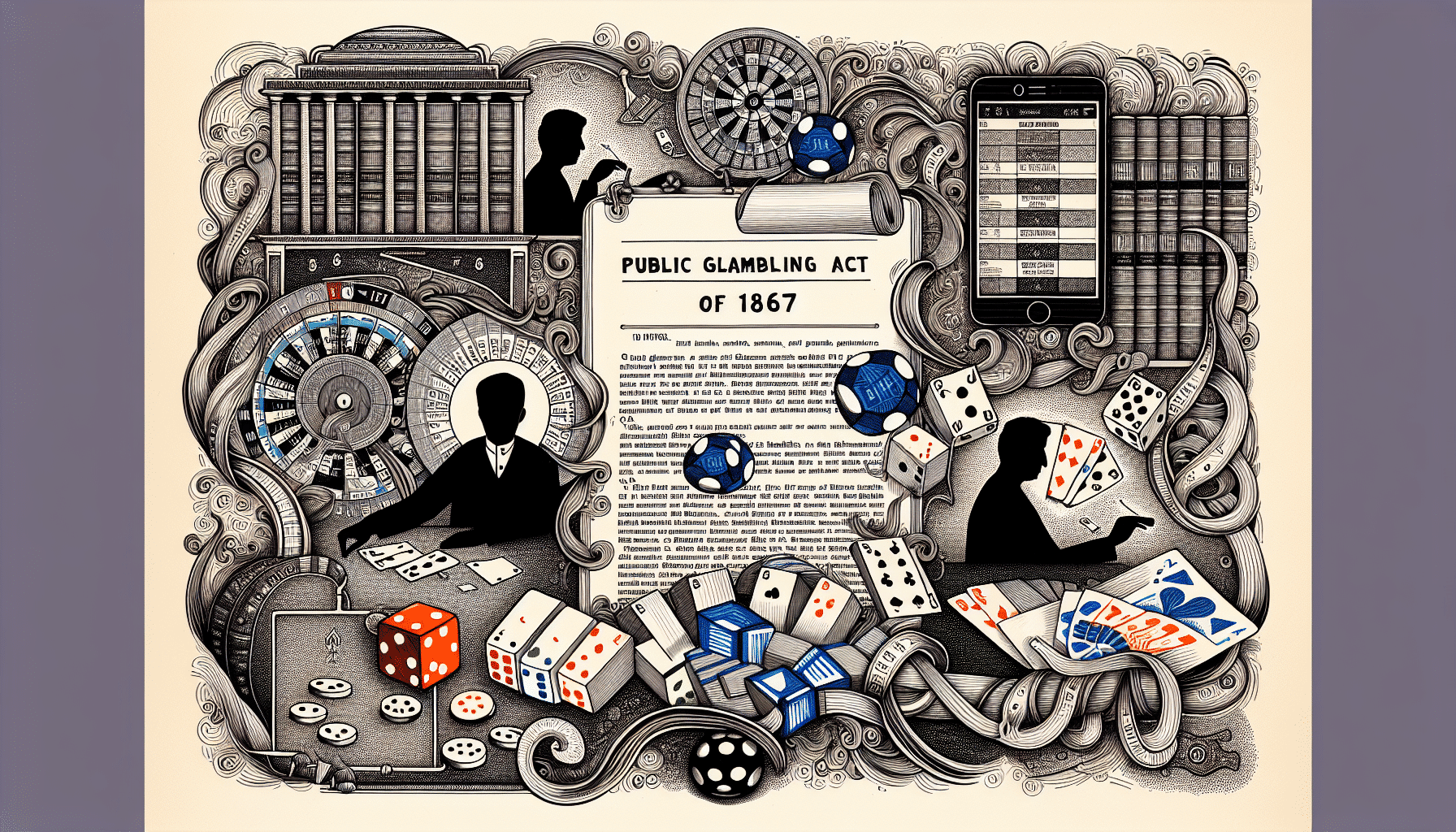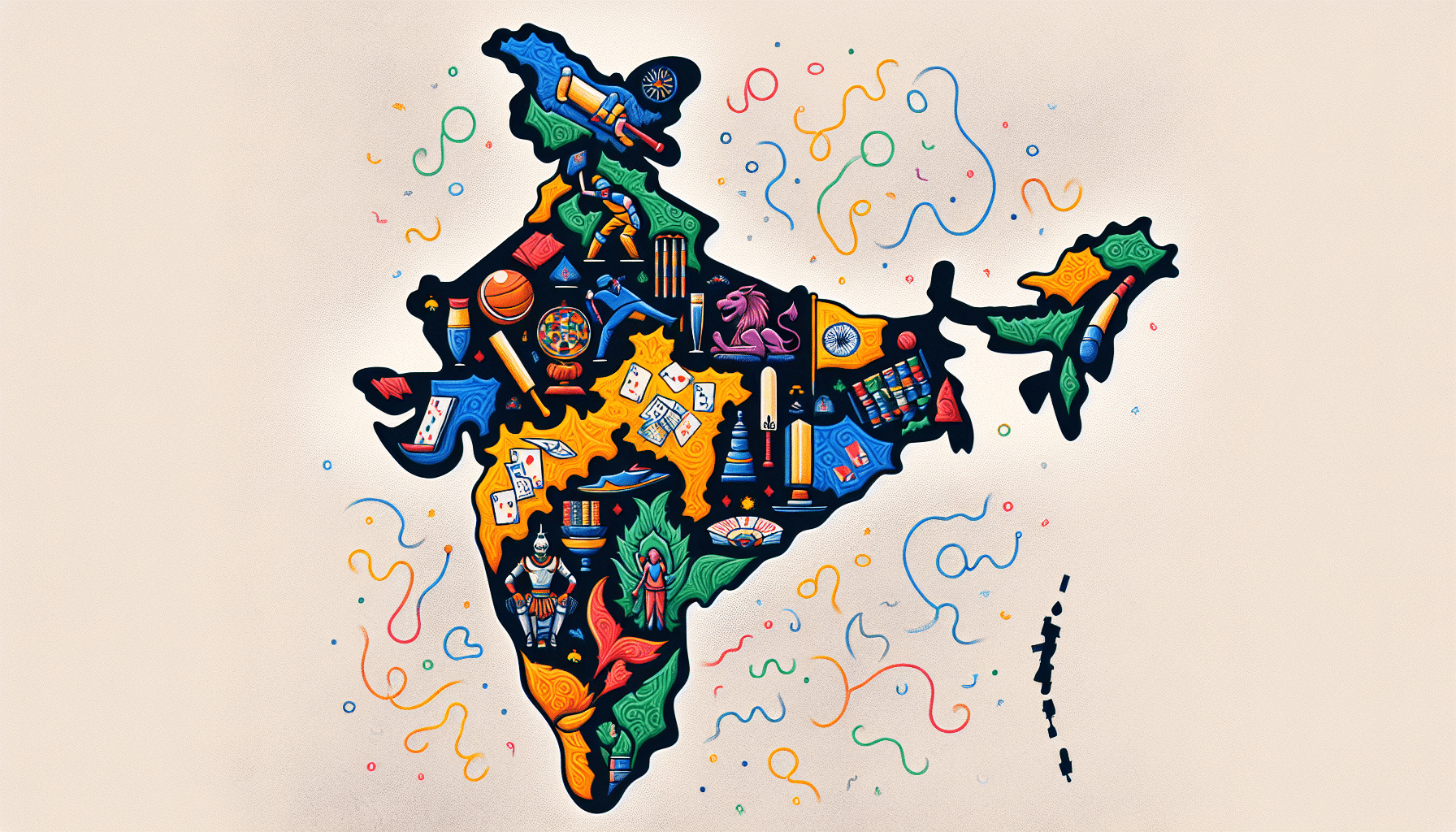Assessing the legality of online gambling in India requires sifting through a patchwork of dated national laws and diverse state legislations. This article dives directly into whether it’s legal to roll the dice online in India, specifically addressing the topic of “online gambling in India legal” status, guiding you through the tangled web of do’s and don’ts, without selling you short on details or clarity.
Key Takeaways
- The Public Gambling Act of 1867 remains the primary but outdated law regulating gambling in India, with silence on online gambling leading to a fragmented regulatory environment where individual states create their own laws, resulting in a diverse legal landscape across the country.
- While the Information Technology Act of 2000 governs online activities in India, it does not address online gambling directly, leading to uncertainty and anticipation for the Online Gaming Rules which are expected to offer more clarity for the industry.
- The legal status of various online gambling activities like sports betting, casino games, and fantasy sports varies significantly among states, with some recognizing certain activities as legal while others enforce strict prohibitions, highlighting the inconsistency and complexity of India’s gambling regulations.
Understanding India’s Gambling Laws

Entering the world of gambling in India resembles stepping into an elaborate mansion, with numerous doors each leading to a distinct set of rules. At the heart of this mansion lies the Public Gambling Act of 1867, a cornerstone of Indian gambling legislation that, while silent on the topic of online gambling, has been the foundation upon which many states have built their own legal structures. Yet, this silence speaks volumes, creating an air of uncertainty around online casino games and leaving the online gambling industry to navigate a sea of ambiguity.
Diverse as the country itself, the legislative power rests with the states, each with the autonomy to enact gambling laws as varied as their cultures, resulting in a patchwork quilt of regulations that adds to the complexity of gambling activities within the subcontinent.
Public Gambling Act
The Public Gambling Act of 1867, enacted under British rule, remains relevant despite its roots in India’s colonial past. This venerable law prohibits the operation or visitation of a ‘common gaming house,’ a term quaintly reminiscent of a bygone era. Punishments under the Act serve as a deterrent for those involved in gambling activities, yet the term ‘online’ is conspicuous by its absence, leaving online gambling in a legal grey area.
Although many states have adopted the Act, each one has introduced its individual amendments, contributing to the complexity of an already convoluted legal framework.
State-Specific Laws
In India’s dynamic legal environment, some states have emerged as trailblazers, navigating through the maze of antiquated central laws. States such as Goa, Sikkim, and Nagaland have taken the initiative to establish licensing regimes, carving out niches for online gaming within their borders. On the other hand, legal battles wage in states like Telangana and Andhra Pradesh, where recent amendments challenge the very fabric of online gaming, including skill-based games, and Tamil Nadu stands as a bastion of prohibition with laws banning online gambling and certain games of chance.
These unique state laws underline the fragmented legal environment of gambling in India, showcasing the varied approaches to online gaming regulation.
Skill vs Chance
In the Indian legal arena, the game of skill versus the game of chance is a contest with high stakes. Games where skill predominates over chance escape the snares of gambling regulations, enjoying an exemption that games of mere luck do not. This distinction is not set in stone but rather subject to the whims of judicial interpretation, as seen in landmark cases that have carved the niches for skill games within the Indian legal framework.
Despite this, the ambiguity lingers like a persistent fog around online casino games that often blend skill with chance, leaving their legal status shrouded in uncertainty.
Online Gaming Regulations in India
As you delve further into the domain of online gaming in India, you encounter a landscape lacking a holistic regulatory framework. This absence leaves both players and companies navigating an open sea with few guidelines or protections, creating a scenario akin to the Wild West of the digital age.
The Information Technology Act of 2000 casts a wide net over online media, yet it stops short of specifically addressing online gambling, leaving operators and users in a state of legal limbo. This ‘patchwork of laws’ presents a complex path for those seeking to engage lawfully in online gambling activities, amplifying the urgency for a standardized Online Games Act.
Information Technology Act
The Information Technology Act of 2000, although a guiding light for electronic commerce, only dimly illuminates the murky realm of online gambling. Its provisions, though broad, fail to shed light on the specifics of online wagering, contributing to the prevailing legal ambiguities.
However, with the recent amendments to the IT Rules, there’s an anticipation of a sunrise on the horizon, as the government exercises its discretionary power to form legislation that may impact online gaming significantly. The industry awaits the implementation of the Online Gaming Rules with bated breath, hopeful for a new central legal framework that will clarify the murky waters of online gaming platforms.
State-Specific Online Gaming Laws
While the central government grapples with the digital realm, individual states have taken matters into their own hands. States like Telangana and Andhra Pradesh have drawn their swords against many forms of real-money online gaming, including online money gaming and those based on skill, enacting bans that leave no room for ambiguity. Contrastingly, Sikkim stands as an online gambling haven, recognizing and regulating the activity through licensing since 2010.
Meanwhile, states like Nagaland have etched out specific rules for skill-based games, and recent moves in Tamil Nadu suggest the rise of new regulatory authorities that promise to reshape the industry.
Legal Status of Popular Online Gambling Activities

Deciphering the legal status of popular online gambling activities in India is like peeling an onion – each layer uncovers a fresh complexity, a diverse interpretation. From sports betting to casino games and fantasy sports, the legality of these activities is as diverse as the states themselves, each with its own regulatory stance that can either nurture or stifle the industry.
Sports Betting
The sphere of sports betting, including horse race betting, is a combat zone of legal interpretations, as the Supreme Court of India acknowledges activities such as horse racing as games of skill, thereby impacting their legal status. This recognition, however, has not translated into a clear legal status, leaving sports betting to navigate the turbulent waters of India’s fragmented regulatory environment.
Casino Games
Casino games find themselves in a peculiar situation within the Indian legal maze. While most of the country adheres to stringent prohibitions, states like Goa and Sikkim have rolled out the red carpet for these games, offering a glimpse into a state-by-state approach that could potentially inspire others to follow suit.
This patchwork of permissions highlights the autonomy states have in crafting their gambling laws, which can both confound and comfort players and operators alike.
Fantasy Sports
Fantasy sports, however, have carved out a legal niche for themselves, with their recognition as games of skill shielding them from the vagaries of gambling regulations. Their meteoric rise in popularity, fueled by technological advancements and a burgeoning user base, has positioned India as a potential powerhouse in the global fantasy sports market.
Offshore Casinos and VPNs: Navigating the Grey Area

Offshore casinos entice Indian players, with numerous individuals resorting to VPNs as a tool to traverse the ambiguous realm of international gaming platforms. While the use of VPNs in itself is not illegal in India, it is the purpose that can potentially steer one into troubled legal waters, particularly when used to access banned websites.
Despite such risks, the absence of any notable prosecution of Indian players at offshore sites speaks to the complexity and lack of clarity in the current legal framework.
Responsible Gambling and Player Protection

With the expansion of Indian online casinos, the focus on responsible gambling and player protection intensifies. The industry is awakening to the importance of creating a safe and sustainable gaming environment, with initiatives and partnerships that aim to address gambling issues in a comprehensive manner.
The deployment of age verification processes, self-exclusion programs, and educational resources by operators reflects a commitment to responsible gambling that is vital for the industry’s long-term health.
The Future of Online Gambling in India
Looking ahead, the future of online gambling in India is set to be as vibrant as its history. Advances in technology such as Artificial Intelligence and Blockchain are poised to revolutionize the industry, potentially enhancing responsible gambling measures and providing a more secure and personalized gaming experience for players.
Upcoming Reforms
On the regulatory front, the winds of change are blowing, with the Indian government recently directing states to crack down on outdoor advertisements promoting online betting platforms. This is indicative of a broader push towards more stringent regulations, with studies highlighting the need for reforms to address reliability and transaction issues faced by online gamblers.
Legal Challenges and Litigations
But the road ahead is not without its challenges. Legal battles continue to surface, with courts grappling with the distinction between real money games of skill and chance when stakes are involved. These disputes, as seen in the Madras High Court, underscore the ongoing struggle to develop a coherent legal framework that can encompass the complexities of online gambling.
Industry Growth and Opportunities
In the midst of these legal gymnastics, the online gambling industry in India is bracing for a growth spurt. Regions such as:
- Delhi
- Maharashtra
- Uttar Pradesh
- Karnataka
The online game industry is ripe for expansion, with certain demographics showing an increased propensity for online gaming and online games.
This projected growth spells opportunities for operators and players alike, setting the stage for a vibrant future for the industry.
Summary
As we reach the end of our exploration, it’s clear that the legal landscape of online gambling in India is as intricate and diverse as a finely woven saree. From the archaic Public Gambling Act to state-specific laws and the burgeoning online gaming industry, the interplay of regulations and technological advancements paints a picture of an industry at the cusp of transformation. The future beckons with promises of reform, growth, and innovation, but also with legal challenges that will test the resilience and adaptability of the Indian online gambling ecosystem.


